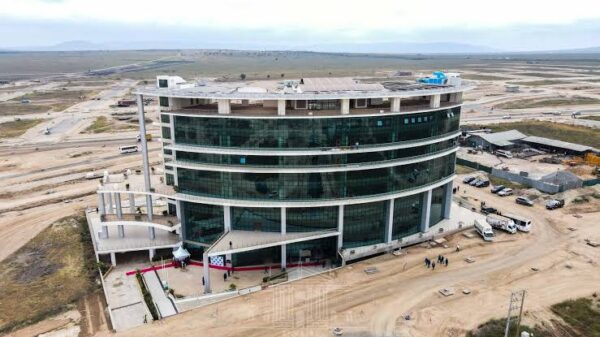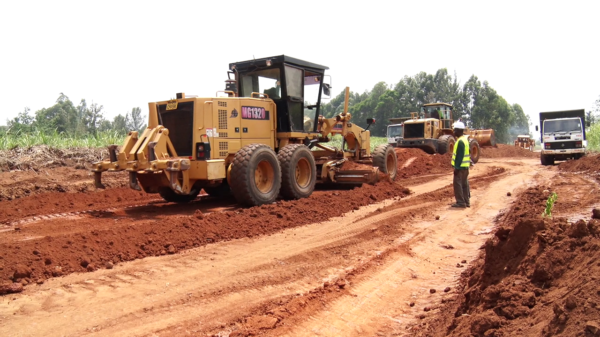
Nairobi Securities Exchange CEO Mr. Geoffrey Odundo flanked by Sanlam Kenya Group Chief Executive Officer Mr. Mugo Kibati are all smiles as Sanlam Investments Economist Arthur Kamp rings the trading bell at the Nairobi Securities Exchange/COURTESY
NAIROBI, Kenya, Jun 23 – A globally acclaimed Investment Economist has expressed optimism at the swift recovery of the Kenyan economy, post this year’s August General Election.
Sanlam Group Investment Economist, Arthur Kamp in an analytical presentation noted that the Kenyan and regional economies are exhibiting resilience ahead of the General Election with clear signs of a swift take off post August.
“Assuming certain conditions, this should hopefully be a good time to make your capital markets and related structured investments as the market is seemingly on an artificial lull, ahead of the general elections” Kamp said at an event organised by Sanlam Kenya and graced by the Nairobi Securities Exchange CEO, Geoffrey Odundo.
According to the Kenya National Bureau of Statistics Economic Survey 2017, Kenya’s Gross Domestic Product (GDP) is estimated to have expanded by 5.8 per cent in 2016 compared to a revised growth of 5.7 per cent in 2015.
On his part, Kamp expressed that the local economy, would grow as good as last year in the coming year based on economic and governance reforms proposed by the respective presidential candidates and a solid foundation already set.
“In my estimation, GDP growth should remain amongst the light of SSA economies in the next three years if ongoing reforms as outlined in the Vision 2030 National development plan are maintained with zero tolerance for corruption and other investment limiting barriers,” Kamp said.
The local economy, Kamp said, will continue to enjoy moderate growth in the medium term if East African economies continue pursuing productivity enhancing measures such as the Standard Gauge railway projects in Kenya, Uganda and Tanzania.
Based on external macro-economic factors, Kamp, outlined the need to exercise caution to avoid raising the national investment ratios to unsustainable levels as such developments lead to “tears”.
He expressed regret that developing countries, will continue to walk a tight rope seeking to reduce their debt burden on one end while experiencing weak growth. Fundamentally, Kamp, stressed the need to progressively reduce the rate of external borrowing for non-productive economic programmes while raising domestic investment ratios.
While articulating his argument for growth, Kamp, said the envisaged growth will need to be anchored on a growth model that is focused on sound economic governance and human capital. The growth model, which does not does not pick up on natural resource endowment he said, helps to enhance investments in the capital markets among other economic prospects.
The execution of economic production enhancing strategies ahead and post the general elections, he said, is likely to raise the return on investment for foreign and local investors, in an environment where the capital stock does not appear excessive relative to the size of GDP.
“At Sanlam, we are positive and optimistic that the regional economies will continue to enjoy moderate fixed investment ratios against a backdrop of moderate capital stock levels,” Kamp said, adding that, “the East Africa economies will enjoy significant foreign investment inflows if they continue pursuing productivity enhancing measures.”
The Kenyan market, he added will particularly provide the growth impetus for the regional economy with positive strides already made on the financial inclusion front. Countries that have managed to actively bridge the financial access gap such as Kenya, South Africa and Namibia, he pointed out will continue to enjoy significant economic growth.
In the African continent, Kamp noted that the East Africa region has continued to enjoy a stellar growth track record since the global financial crisis.
While proposing the need to adopt a long-term economic structure to accelerate growth, Kamp, stressed the need for a manufacturing economy as envisaged in Kenya’s Vision 2030 national development plan.
A transition from a primarily agricultural oriented economic production to a manufacturing economy, he said, will provide significant gains.
“Productivity gains as countries shift from primarily agricultural production to manufacturing where productivity gains are higher,” Kamp said. “Such a manufacturing economy also promotes urbanisation, which encourages development of manufacturing and services sectors with ICT imports adding to the overall productivity gains.”


































